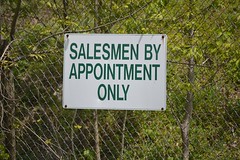The Internet has become a great place to find new readers and potential book customers. A lot of the time, we think about marketing messages that we get to send out on our own platforms: our blogs, our Twitter accounts, our Facebook pages. And that’s a great way to interact with your readers and keep them engaged, but it probably won’t do much to help you find new readers.
Say what? Aren’t new readers supposed to see how awesome we are on the Interwebz and then come to us?
 When is the last time that you, as a reader, came to an author’s books through his/her website, blog, Facebook or Twitter? It happens, but it’s extremely rare. So how do you go hunting for these elusive new readers?
When is the last time that you, as a reader, came to an author’s books through his/her website, blog, Facebook or Twitter? It happens, but it’s extremely rare. So how do you go hunting for these elusive new readers?
Well, the answer is, sort of, you don’t. You have to approach it from a different mindset. You’re not hunting for victims to wrest away their dollars on your book—you’d probably have more luck picking pockets! Instead, we’re building relationships with people who love the same kinds of books we do. If you’re going to go into a community of readers with the attitude of burn and conquer, you’ll crash and burn, and quick.
It’s that darn sincerity thing again
People can see a shill a mile off, and they won’t stand for it. If we come into a reader community looking to take advantage of the people there, it will come through in every post you make, and you’ll be making the opposite of friends.
Please say it with me: don’t join a readers’ community to push your books. Don’t join a readers’ community to push your books. Don’t join a readers’ community to push your books.
But . . . you said . . .
Yes, I know, I said you can find new readers in readers’ communities. But that doesn’t mean you should respond to every “What should I read next?” post with “MY BOOK HEREAREEIGHTY-SEVENPURCHASELINKSHAVEACOUPON!!!!”
Social media—like readers’ communities—is about being social. It’s built on relationships—and not the buyer/seller relationship. Like I also said before, when we approach a readers’ community, it’s with the attitude of building relationships with people who love the same kinds of books we do.
You do read in your genre, don’t you? Your genre is one of your favorites, right? Then you’ve got all the credentials you need to hang out with other people who read in your genre.
Not. Being. Pushy.
In case I haven’t hammered this home yet, let me reiterate that aggressively pushing your book will not sell it. This is true in all media—just like constantly blogging or Tweeting or Facebooking “BUY MY BOOK HEREAREEIGHTY-SEVENPURCHASELINKSHAVEACOUPON!!!!“, attacking a readers’ community and carpetbombing it with coupons is not an effective marketing strategy.
So, then, what can you do?
- Look around to see how other authors interact. Figure out if you want to mimic their styles, see what works for them, figure out the best way to interact with people here.
- Mention your book in your post signature—but again, don’t be pushy. The title, the tagline, the cover image, and genre, maybe.
- Do reply to and acknowledge people who ask you about your book directly.
 You might also consider offering a coupon to members of the community (if you have that capability, such as via self-publishing on Smashwords) or other incentive—but only after you’ve made a good, consistent effort to build those genuine relationships and get to know the community.
You might also consider offering a coupon to members of the community (if you have that capability, such as via self-publishing on Smashwords) or other incentive—but only after you’ve made a good, consistent effort to build those genuine relationships and get to know the community.
Reader Community Etiquette
Again, the best first step is to observe the community first. If there are any other authors there, pay special attention to them, how they mention their books, how they approach relationships there. They might not be good examples, but you might learn even more effectively from bad examples.
A few blanket caveats:
- Do not engage with trolls (belligerent and abusive people) at any time or any place.
- Choose your battles—and better yet, walk away.
- Do NOT argue with people who didn’t like your book. Publishing is subjective. You haven’t loved everything you’ve ever read, have you?
- Even if they get the facts wrong, DO NOT ARGUE WITH PEOPLE ABOUT YOUR BOOK.
- Never, never, never attack someone for disagreeing with you—especially not about your book.
- In fact, if there’s a discussion on your book, unless you’re invited to join, it might be best to stay away.
I’ve had this post written for over a month, but I’ve been sick and tired. Sorry about the delay! I hope we’ll be getting back to a more regular posting schedule as I pull out my “gearing up for NaNoWriMo” posts, as well as inspirational posts to help us through everyone’s favorite month!
So, what do you think? Where do you hang out as a reader? What kind of online behaviors from an author have you seen that you like or don’t like? Are you doing Nano?
Photo credits: salesman—Pete Simon; Salesmen seen by appointment only—John

